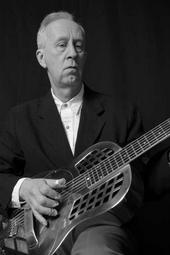As a teenager learning the guitar in the suburbs of Los Angeles, James became interested in blues around 1966; while listening to many of the great originals such as Bukka White, Lightnin’ Hopkins, Mance Lipscomb and Johnny Shines, at the Ash Grove folk club in L.A.
He formed one of the city’s first blues bands, playing a primitive Hubert Sumlin-style lead, and slide guitar in a Muddy Waters/Elmore James vein.
It was at this time, James was given a 1930's National Style O resonator guitar which had been gathering dust in the garage of his drummer's father. that started a lifelong love of these wonderful instruments.
From 1970 - 71, he went on the road in a R&B/Soul band fronted by the Spruell Brothers from Los Angeles.
He joined Detroit bluesman, Chick Willis’ band (which had a regional blues hit record at the time), playing blues joints throughout the mid-west.
Returning to California to find the blues scene in one of its many slumps, he played in various rock and rockabilly roots-type bands.
In the late 1980's James lived in London, England performing with Real Rock Drive, a group playing a jump/jive style of music.
Returning to Los Angeles. he joined up with harmonica virtuoso Red Grant in a group called Loaded Dice. Already acclaimed as one of the area’s best slide guitarists, James started moving away from the electric Chicago blues sound, and focusing more on the Mississippi Delta style that originally inspired him. He started playing more acoustic gigs, both with his group, and as a soloist.
He formed Tobacco Road, and developed a large local following in Southern California. He played the Claremont Folk & Blues Festival several times, and opened for The Blasters, John Hiatt, Rod Piazza and James Harmon.
Tobacco Road featured harmonica ace, Jeff Masters, and
Rick Reed, one of the country's top stand up bass players.
During this period, James was playing an acoustic gig, when he noticed an eager listener sitting at his feet, closely watching every move on his guitar. During a break, the listener approached him, saying “I just have to tell you that you are one of the best guitarists I’ve heard and I love what you are doing,†He introduced himself as John Fogerty.
Stunned, James could only comment that he was a real fan of John’s music; to which Fogerty replied,
“Well, I’m a fan of yours, nowâ€.
In 2005, tired of the southern California suburban sprawl and its disjointed blues scene, ames moved to Portland, Oregon, where he is performing, recording and teaching guitar.
